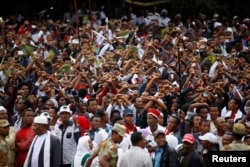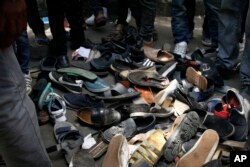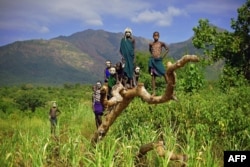Protesters in Ethiopia damaged almost a dozen mostly foreign-owned factories and flower farms and destroyed scores of vehicles this week, adding economic casualties to a rising death toll in a wave of unrest over land grabs and rights.
The violence has cast a shadow over a nation where a state-led industrial drive has created one of Africa's fastest-growing economies, but where the government has also faced rising international criticism and popular opposition to its authoritarian approach to development.
The flare-up followed the death of at least 55 people in a stampede Sunday when police fired tear gas and shot into the air to disperse demonstrators in the Oromiya region near the capital.
It raises to more than 450 the number of people rights groups and opponents say have been killed in unrest since 2015.
A U.S. researcher was killed Tuesday when her car was attacked by stone-throwers near Addis Ababa.
The government says the toll cited by critics is inflated.
Fana Broadcasting, which is seen as close to the state, reported on its website that 11 companies ranging from textile firms to a plastics maker to flower farms had been damaged or destroyed, while more than 60 vehicles had been torched.
Dutch firm FV SeleQt said its 300-hectare vegetable farm and warehouse had been plundered. Another Dutch firm, Africa Juice, said its factory had been badly damaged.
The manager of one of the Turkish companies, textile firm Saygin Dima, told Reuters this week at least a third of his factory was burned down.
Fana's website showed images of burned-out trucks on the roadside, blaming the damage on "perpetrators of violence," echoing the line taken by the government, which accuses local rebel groups and dissidents based abroad for stoking the unrest.
It said the firms damaged had created 40,000 jobs in a country of 99 million people that has long been blighted by famine but which has been rapidly transforming its fortunes, delivering growth rates that hit 10 percent in fiscal 2015-16.
Struggling for work
People from Oromiya, a region at the heart of the state's industrialization efforts, accuse the state of seizing their land and offering tiny compensation, before selling it on to companies, often foreign investors, at inflated prices.
They also say they struggle to find work, even when a new factory is sited on property they or their families once owned.
"I went to apply for a job at a steel factory that was built on my family's land but I was turned away when they discovered I was the son of the previous land owner," said Mulugeta, who asked for only his first name to be used to avoid any state reprisals.
"Most factories give priority to employees from other regions for fear local people would one day stage strikes," he said, speaking by telephone from Oromiya, where he now drives a truck for another company.
In Ethiopia, once ruled by Marxists whose draconian policies drove the nation into a devastating 1984 famine, all land still belongs to the state and owners are only deemed leaseholders, even if they have been living or farming there for generations.
For the state, it means a swift and legally uncomplicated route to ejecting leaseholders to make way for new factories and construction of highways and railways, including a 750-km electrified line opened this week that links the capital of landlocked Ethiopia with Djibouti's busy sea port.
For the opposition and those turfed out of farm plots where they grow food for their families, it shows how the government that has ruled for a quarter of a century tramples on their rights.
"It is time for the government to change tack," said Merera Gudina, chairman of the opposition Oromo Federalist Congress. "People are demanding change, but the problem is the only language the government knows is the use of excessive force."
The government says police have clashed with what it calls "armed gangs" intent on destabilizing the nation. A regional Oromo official accused protesters of hindering efforts to reverse generations of poverty in Oromiya.
Pressure has been mounting from abroad, too. U.S. President Barack Obama told his Ethiopian hosts in Addis Ababa last year that greater political openness would "strengthen rather than inhibit" the development agenda. The government said it differed over the pace of any reforms demanded by Washington.
"Economic development has outpaced political change," said former U.S. ambassador to Ethiopia and academic David Shinn.
Noting "phenomenal" economic gains, he said: "It is less clear, however, whether the Ethiopian peasant farmer, who still constitutes about 80 percent of the population, has benefited significantly."
Feeling the heat
Foreign investors are feeling the heat from protesters, not because they are foreigners but because they are among the biggest purchasers of the new land leases from the state.
Ethiopia's budding tourist industry is also taking a hit.
The Bishangari Lodge, on Lake Langano about 200 km south of Addis Ababa, was looted and torched this week.
Resort owner Omar Bagersh said, even before the attack, he had had 90 percent cancellations in the past two or three months. "It is very difficult to convince a tourist to travel to a country that has this kind of situation," he said.
Investors have been attracted by cheap electricity from Ethiopia's huge new hydroelectric dams being built, cheap labor, improving transport and tax incentives offered by a financially stretched government hungry for foreign exchange.
New industries have been focused in Oromiya and the nearby Amhara regions, which surround Addis Ababa, a city that now boasts Sub-Saharan Africa's only light rail metro system and a rapidly rising skyline.
Protests in Oromiya province initially erupted in 2014 over a development plan for the capital that would have expanded its boundaries, a move seen as threatening farmland.
Clashes with police flared in 2015 and this year, although the government has shelved the boundary plan.
Protesters have increasingly focused on broader political issues, accusing the government of stifling opposition. The government, which won a parliamentary election in 2015 in which the opposition failed to secure a single seat, denies this.









